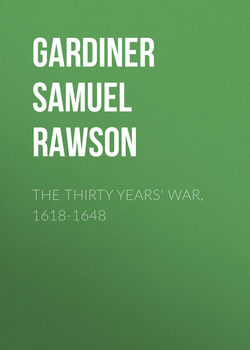Читать книгу The Thirty Years' War, 1618-1648 - Gardiner Samuel Rawson - Страница 4
CHAPTER I.
CAUSES OF THE THIRTY YEARS' WAR
Section III. —Reaction against Protestantism
Оглавление§ 1. Theological disputes among Protestants.
In course of time Protestantism, in its turn, exposed itself to attack. Each petty court soon had its own school of theologians, whose minds were dwarfed to the limits of the circle which they influenced with their logic and their eloquence. The healthful feeling which springs from action on a large stage was wanting to them. Bitterly wrangling with one another, they were eager to call in the secular arm against their opponents. Seizing the opportunity, the newly-constituted order of Jesuits stepped forward to bid silence in the name of the renovated Papal Church, alone, as they urged, able to give peace instead of strife, certainty instead of disputation. The Protestants were taken at a disadvantage. The enthusiasm of a national life, which repelled the Jesuits in the England of the sixteenth century, and the enthusiasm of scientific knowledge which repels them in the Germany of the nineteenth century, were alike wanting to a Germany in which national life was a dream of the past, and science a dream of the future. Luther had long ago passed away from the world. Melanchthon's last days were spent in hopeless protest against the evil around him. 'For two reasons,' he said, as he lay upon his death-bed, 'I desire to leave this life: First, that I may enjoy the sight, which I long for, of the Son of God and of the Church in Heaven. Next, that I may be set free from the monstrous and implacable hatreds of the theologians.'
§ 2. The Catholics make progress.
In the face of a divided people, or self-seeking princes, and of conflicting theories, the Jesuits made their way. Step by step the Catholic reaction gained ground, not without compulsion, but also not without that moral force which makes compulsion possible. The bishops and abbots gave their subjects the choice between conversion and exile. An attempt made by the Archbishop of Cologne to marry and turn Protestant was too plainly in contradiction to the Ecclesiastical Reservation to prosper, and when the Protestant majority of the Chapter of Strasburg elected a Protestant bishop they were soon overpowered. A Protestant Archbishop of Magdeburg offering to take his place amongst the princes of the Empire at the Diet was refused admission, and though nothing was done to dispossess him and the other northern administrators of their sees, yet a slur had been cast upon their title which they were anxious to efface. A few years later a legal decision was obtained in the cases of four monasteries secularized after the Convention of Passau, and that decision was adverse to the claim of the Protestants.
§ 3. The disputes which led finally to war.
Out of these two disputes – the dispute about the Protestant administrators and the dispute about the secularized lands – the Thirty Years' War arose. The Catholic party stood upon the strict letter of the law, according, at least, to their own interpretation, and asked that everything might be replaced in the condition in which it was in 1552, the date of the Convention of Passau. The Protestant view, that consideration should be taken for changes, many of which at the end of the sixteenth century were at least a generation old, may or may not have been in accordance with the law, but it was certainly in accordance with the desires of the greater part of the population affected by them.
§ 4. No popular representation.
There is every reason to believe that if Germany had possessed anything like a popular representation its voice would have spoken in favour of some kind of compromise. There is no trace of any mutual hostility between the populations of the Catholic and Protestant districts apart from their rulers.
